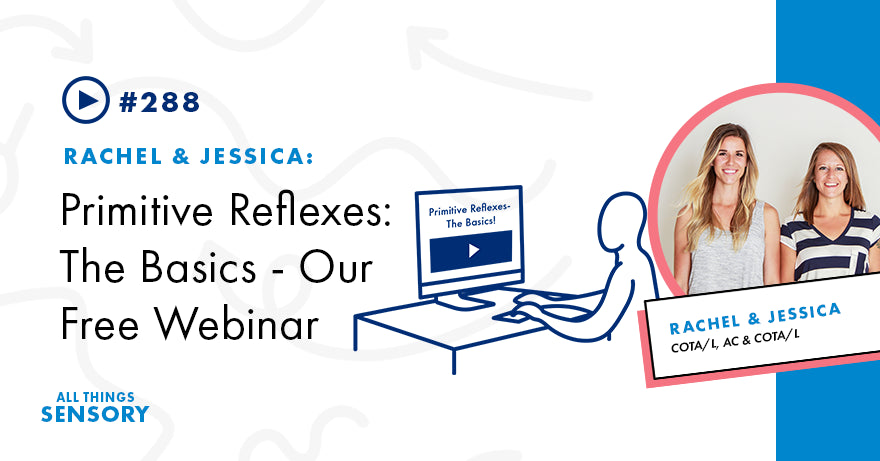Your Cart is Empty

What are primitive reflexes? Why are they important? What are the signs of retained primitive reflexes? How can you help a child who has retained primitive reflexes
Listen in and get the answers to these questions, and more!
WATCH The Primitive Reflex Webinar and get access to the FREE downloads!
Dive into the FULL digital course, Assessment and Integration of Primitive Reflexes for Improved Independence in Daily Activities
Make sure to check out all of our links below!
We’d love to answer your questions on the podcast! Fill out this form -> https://harkla.typeform.com/to/ItWxQNP3
All Things Sensory Podcast Instagram
Harkla Website - Shop Sensory Products!
Understanding and integrating primitive reflexes is crucial, especially for children with sensitive sensory systems. We want to share a new course covering the developmental importance of reflexes such as the Moro, TLR, and STNR in infants, emphasizing the need for sensory and reflex integration from a young age.
Primitive reflexes are automatic movements directed by the brainstem that develop in utero and assist infants in survival and early development. They include reflexes like the Moro reflex (startle reflex), which helps a baby react to sudden stimuli, and the ATNR (asymmetrical tonic neck reflex), which plays a role in the birthing process and early motor development.
These reflexes are crucial for a baby's survival and developmental milestones. As the child grows, they should integrate or mature into more advanced motor patterns.
When primitive reflexes don't integrate properly, they can lead to challenges in coordination, cognitive development, emotional regulation, and daily functioning.
Some signs that a child may have retained primitive reflexes include:
To identify retained reflexes, observe your child's movements and behavior. Testing can involve specific activities that reveal whether reflexes are still active.
Here are some activities to help integrate retained reflexes:
If you suspect your child has retained primitive reflexes, consider the following steps:
Primitive reflexes are foundational for a child's development, and understanding them can significantly impact their growth and daily functioning. To learn more and access resources, consider checking out our detailed course on primitive reflexes, available through Harkla.
BORING, BUT NECESSARY LEGAL DISCLAIMERS
While we make every effort to share correct information, we are still learning. We will double check all of our facts but realize that medicine is a constantly changing science and art. One doctor / therapist may have a different way of doing things from another. We are simply presenting our views and opinions on how to address common sensory challenges, health related difficulties and what we have found to be beneficial that will be as evidenced based as possible. By listening to this podcast, you agree not to use this podcast as medical advice to treat any medical condition in either yourself or your children. Consult your child’s pediatrician/ therapist for any medical issues that he or she may be having. This entire disclaimer also applies to any guests or contributors to the podcast. Under no circumstances shall Rachel Harrington, Harkla, Jessica Hill, or any guests or contributors to the podcast, as well as any employees, associates, or affiliates of Harkla, be responsible for damages arising from use of the podcast.
Keep in mind that we may receive commissions when you click our links and make purchases. However, this does not impact our reviews and comparisons. We try our best to keep things fair and balanced, in order to help you make the best choice for you.
This podcast should not be used in any legal capacity whatsoever, including but not limited to establishing “standard of care” in a legal sense or as a basis for expert witness testimony. No guarantee is given regarding the accuracy of any statements or opinions made on the podcast.
Comments will be approved before showing up.
karla
August 29, 2025
I´m a mother interested in test and work with my son integreting primitive reflexes. He is 14 and because of a big crysis he disintegrated the primitive reflexes. Thas is what the OT told us. He had started therapy but we had to move and we can´t find something around here in Mexico. thank you